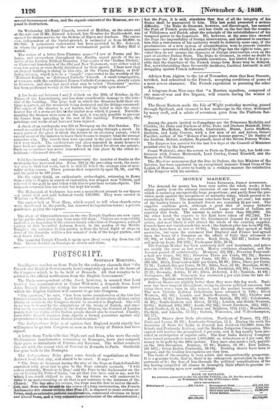POSTSCRIPT.
SATURDAY MORNING.
Intelligence reaches us from Paris by the ordinary channels that "the French and English Governments have completely agreed on the bases of the Congress which is to be held at Brussels. All that remains to be settled is the official notification from the English Government."
The. Paris correspondent of the Nord, however, is assured that Lord Cowley has communicated to Count Walcwski a despatch from Lord John Russell distinctly stating the reservations and conditions under which the English Cabinet will consent to go into Congress.
"The question," he says, "has been under consideration at the two last Cabinet Councils in London. Lord John Russell insists above all that entire liberty of action in the Congress should be accorded to England. She will in no way be bound by the stipulations of the treaty of Zurich, and since this treaty reserves the rights of the Italian Princes, the Cabinet of London insists that the rights of the Italian people should also be reserved. Finally, Lord John Russell requires from Austria a formal guarantee against any preponderance iu the future Italian Confederation."
The Indpcndaxce Beige is of opinion that England would signify her willingness to go into Congress as soon as the treaty of Zurich had been signed.
A letter from Turin tells that Mighorati and Rosa, who were the only Piedmonteso functionaries remaining in Romagna, have just resigned their posts as intendants of Ferrara and Ravenna. The writer connects this act with the recent visit of General da Bormida to Paris. Garibaldi has gone back to the Romagna.
The Inth'pendance Beige gives some details of negotiations at Rome derived from that city, and stated to be exact. It says- " The Duke de Gramont during the stay of the Pope at Castel-Gandolfo contrived with great tact to give to the Pope salutary counsels. I will reflect seriously, Monsieur le Due,' said the Pope to the Ambassador on the eve of leaving for Porto d'Anzio, on all that you have said to me, and for which I am much obliged to you. On my return we will endeavour to come to an understanding on all that is not contrary to the interests of the Church.' The day after his return, the Pope was the first to revive the sub- jeot, and from what he said in the course of a long conversation the French Ambassadordilt almost certain that Pius IX. is disposed to make serious re- forms, such as extensive judicial ameliorations, communal elections on large and liberal basee, and a very extensive secularisation of the administration ; but the Pope, it is said, stipulates that first of all the integrity of his States shall be guaranteed to him. This last point presented a serious difficulty. 'I he Duke de Gramont, however, not discouraged, has assured the Pope of French protection, and has dwelt on the fact that the treaties of Villafranca and Zurich adopt the principle of the reestablishment of his temporal power in the Legations. He, however, at the same time showed the Pope the impossibility of foreign intervention, and laboured to convince him that a restoration of his authority would be infinitely more easy, if the proclamation of a new system of adminiiitration were to precede coercive measures—measures which it is admitted the Pope has the right to take, pro- vided they do not assume the character of foreign intervention even on the part of another Italian State. The Duke de Gramont, in order no doubt to encourage the Pope in his favourable intentions, has hinted that it is pos- sible that the departure of the French troops from Rome may be delayed. But, notwithstanding these favourable incidents, Cardinal Antonolli is still struggling against French influence."


























 Previous page
Previous page